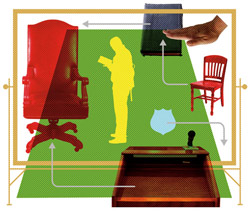Street Smarts: Law Schools Explore Benefits of Teaching Ethics in a Clinical Setting

Illustration by Stuart Bradford
Teaching ethics to law students in a clinical setting is an idea that seems to have gained a toehold in U.S. legal education. In January, Lawrence J. Fox started the Ethics Bureau at Yale Law School in New Haven, Conn. Students participating in the program—currently there are seven—provide advice to lawyers on various ethics issues, according to Fox, a visiting lecturer and partner at Drinker Biddle & Reath in Philadelphia. Fox also is a past chair of the ABA Standing Committee on Ethics and Professional Responsibility.
“These projects are all clinical and dedicated to the proposition that we’re going to provide ethics advice, and our clients are generally lawyers, which is very different from any other clinic,” says Fox. (No decision has been made whether to make the program permanent.)
PROGRAM PIONEERS
Fox’s program at Yale appears to be only the second effort by a law school to establish a clinic that focuses primarily on teaching ethics. Across the country, the California Western School of Law in San Diego has offered the STEPPS program—Skills Training for Ethical and Preventive Practice and Career Satisfaction—for three years. But unlike Yale, STEPPS participants work on simulated cases—even though actors are sometimes used to portray clients—to become familiar with ethics issues they’ll likely encounter in actual practice.
But for all intents and purposes, the cases are real, says professor Timothy Casey, who directs the program, which now has 100 students and will become a requirement next year. “The students communicate by letter with the client,” he says. “It’s not like a class at all; it’s much closer to actual representation.”
But whether this approach to teaching ethics makes the leap from toehold to trend may depend on how much law schools embrace the general concept of clinical education.
In 2007, the Carnegie Foundation for the Advancement of Teaching issued a report, Educating Lawyers: Preparation for the Profession of Law, concluding that the standard approach to legal education in the United States neglects real-world preparation to practice.
“Most law schools give only casual attention to teaching students how to use legal thinking in the complexity of actual law practice,” the report states. “Unlike other professional education, most notably medical school, legal education typically pays relatively little attention to direct training in professional practice. The result is to prolong and reinforce the habits of thinking like a student rather than an apprentice practitioner, conveying the impression that lawyers are more like competitive scholars than attorneys engaged with the problems of clients.”
INADEQUATE PREPARATION
More recently, the Law School Survey of Student Engagement for 2010 reported that only about half the students responding said their law schools prepared them well to deal with ethics dilemmas that may arise in law practice. But students with clinical experience tended to give their schools higher marks on that front than students without clinical experience. The survey is produced by the Indiana University Center for Postsecondary Research in Bloomington.
David A. Santacroce, a clinical professor at the University of Michigan Law School in Ann Arbor and founding president of the Center for the Study of Applied Legal Education, says he is not surprised at the results of the In diana University study. “It reflects how few students have a sense of what it’s like to practice law,” he says. “The analogy is: You wouldn’t dream of going to a doctor if they hadn’t done a residency. It’s the difference between watching the doctor do something and doing it yourself.”
But Santacroce also says the center’s survey of law schools around the country reveals both a growth in clinical programs and a greater willingness to infuse those programs with an increased emphasis on ethics considerations.
“The Carnegie report said there’s not enough real-world, hands-on lawyering in legal education,” Santacroce says, “and part of the answer to that is clinics and courses like they have at Cal Western.”
And now at Yale.



